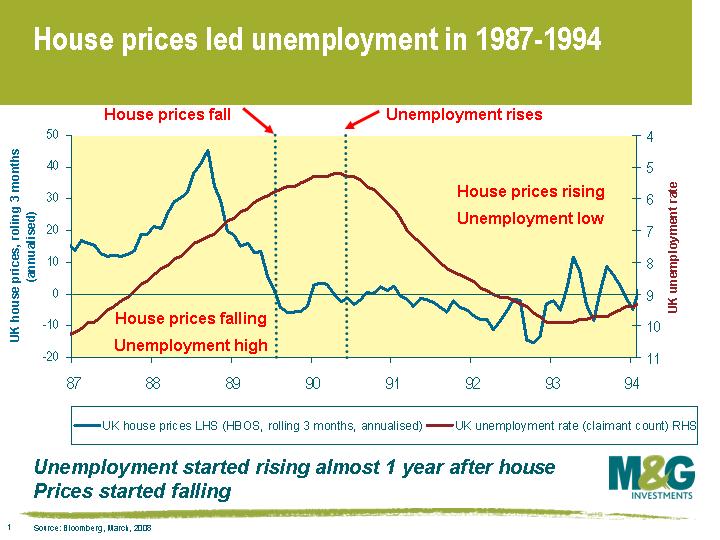UK unemployment lowest since the 1970s – watch it rise
The government’s official unemployment rate (which looks just at the number of people claiming benefits) stands at 2.5%, the lowest rate since 1975. The UK unemployment rate under the International Labour Organisation’s measure stands at a slightly more realistic 5.2%, which is higher that 2003-06, but still way below the long term historical average.
A widely held view is that the UK economy will be OK, because unemployment is low. This view is misplaced. History suggests that unemployment is a lagging indicator – that is, it’s one of the last things to turn in an economic slowdown. What has normally happened in the past is that house prices fall, then consumer spending falls (and economic growth therefore slows), then unemployment rises, and finally inflation starts to fall as spare capacity is created in the economy.

This graph shows what happened in the UK’s last recession. House prices are represented by the blue line, and we’ve looked at house price changes on a rolling 3 months (and annualised). UK unemployment is the red line, and is plotted against the right hand axis (inverted). Last time around, UK house prices started falling in mid- 1989, but unemployment didn’t start rising until mid-1990.
Unemployment is a lagging indicator because it takes companies a while to realise that the economy is slowing. Once companies realise this, it then takes them a while to lay people off. So if you want to get an idea of what’s going to happen to the UK economy (or indeed the US economy), look at the housing market, not the unemployment rate. Anyone who’s focusing on unemployment as a measure of the state of the economy is likely to be well behind the curve
The value of investments will fluctuate, which will cause prices to fall as well as rise and you may not get back the original amount you invested. Past performance is not a guide to future performance.


18 years of comment
Discover historical blogs from our extensive archive with our Blast from the past feature. View the most popular blogs posted this month - 5, 10 or 15 years ago!


Bond Vigilantes
Get Bond Vigilantes updates straight to your inbox





